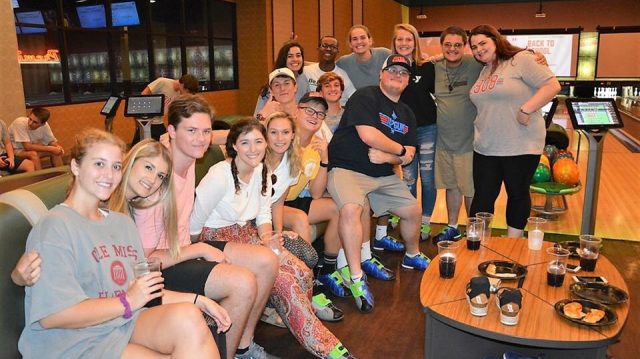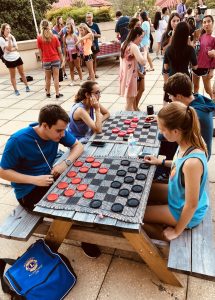
UM Early Entry pharmacy students participate in social activities with other classes within the School of Pharmacy. Submitted photo
OXFORD, Miss. – When Marvin Wilson introduced the idea of an early entry program to the University of Mississippi School of Pharmacy in 1994, he didn’t do so to help student pharmacists find best friends. His goal was to attract more academically ambitious future pharmacists to Ole Miss, not to create cohorts of students that felt like a family within a family.
But in the end, Wilson, who retired as associate dean for academic affairs in 2013, contributed to all of that and more when he designed a program that would allow high-performing high school seniors to secure their spot in the pharmacy professional program right out of high school.
“At the time, there were no other public pharmacy schools in the U.S. that had an early entry program,” Wilson said. “It was a whole new game, working with high school seniors and their parents, but we knew we needed to do a better job of introducing them to pharmacy.”
In the mid-’90s, the Ole Miss pharmacy school updated its curriculum to allow students to earn the Doctor of Pharmacy degree, as well as the Bachelor of Science in Pharmaceutical Sciences. This change meant going from five total years of school to seven.
Wilson and the rest of the pharmacy administration knew this change could be a drawback for some students, so they set out to find new ways to interest them in pharmacy.
The Early Entry Program officially began in the fall of 1995, and throughout its 25 years, more than 1,000 high school seniors with a competitive grade-point average and ACT score, along with a satisfactory interview, have been granted a spot in the pharmacy school’s professional program via the Early Entry program.
Early Entry students are then advised throughout their undergraduate career by pharmacy professors, have access to pharmacy student organizations and learn about opportunities for research and networking, provided they maintain good grades and score well on the Pharmacy College Admissions Test.
Pharmacy graduates who were once Early Entry students are generally more confident and less averse to taking professional risks after having spent seven years as part of the pharmacy school, learning about service, leadership, communication skills and professional opportunities, Wilson noted.

Sophomore Early Entry student Corinne Passman is a member of the Rebelette dance team, in addition to being part of the UM School of Pharmacy’s Early Entry Program. Submitted photo
“The Early Entry Program helped the pharmacy school feel like a bigger part of the university community,” he said. “In addition, we recruited some great students we may not have gotten and the pharmacy profession gained some incredible pharmacists who may have otherwise taken their talents elsewhere.”
For many students, the campus experience is just as important as the Early Entry experience. Corinne Passman, a sophomore Early Entry student from Vestavia Hills, Alabama, said the program’s flexibility and support has allowed her to be a part of the Rebelette dance team while she pursues her degree.
“The Early Entry Program offers so many opportunities to learn about different avenues in pharmacy before starting the pharmacy professional program,” Passman said. “The family aspect of the Early Entry program takes the pharmacy degree beyond the classroom and creates an academic experience that transcends that of a typical major.
“Instead of just learning to pass a class, the Early Entry curriculum makes it so I am learning for life.”
Zane Black, a sophomore from Enterprise who began the Early Entry Program in 2018, said the support of his fellow Early Entry classmates has made pre-pharmacy courses easier.
“My experience as an Early Entry student has been nothing short of fantastic,” Black said. “Even though the coursework has been challenging, I truly enjoy what I’m learning and I know that whenever I have a problem in the classroom or I’m struggling and need some encouragement, I have people around me through this program to help me.”
Although the program draws predominantly from Mississippi, many Early Entry students hail from all over the country, as far away as the West Coast and New England, with a majority of out-of-state students coming from the South and the Midwest.
“When we recruit the best and brightest from their communities, those students will often go back home and tell others about their experiences, which can create a steady stream of Early Entry students from specific places,” Wilson said.

First-year Early Entry students gather at a welcome party in the Living-Learning Community, the optional Early Entry-specific residence hall on the UM campus. Submitted photo
Sophomore Early Entry student Konnor Battle recalled that although he was nervous to come to a new environment where he didn’t know many people, the Early Entry Program gave him a sense of home.
“The best part about the Early Entry Program is the opportunities it offers, as well as the connections made with your classmates and professors,” said Battle, from the Lawrence County community of Jayess. “With these connections, I feel prepared and ready to begin my professional years in pharmacy school.”
With interest coming from all over the country, the school has a dedicated admissions coordinator in addition to two recruiters who travel and communicate with students and parents about all the professional pharmacy programs, including the Early Entry Program.
“The Early Entry Program really acts like a support system for students who are committed to pharmacy, but who also want the Ole Miss experience,” said Chelsea Bennett, the school’s assistant dean for student services on the Oxford campus. “They study together, watch out for each other and, ultimately, help each other succeed.”
The program has proven to be beneficial for students, the school and the university, but the best part for those who work with Early Entry students is watching them succeed.
“Seeing our students grow into caring and highly-skilled pharmacy professionals is nothing short of amazing,” said David D. Allen, dean of the pharmacy school.
“Because of the program’s outreach, more people in more places know about the incredible pharmacy education they can receive at Ole Miss, and more people know about the potential of a career in pharmacy.”
For more information on the Early Entry program, visit https://pharmacy.olemiss.edu/earlyentry/ or contact admissions coordinator Lindsey Cooper at lindsey@olemiss.edu or 662-915-1323.